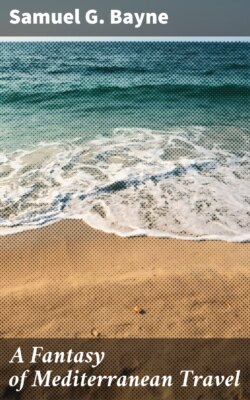Читать книгу A Fantasy of Mediterranean Travel - Samuel G. Bayne - Страница 44
На сайте Литреса книга снята с продажи.
MADEIRA
ОглавлениеTable of Contents
We lit right out for Madeira, and after a pleasant but uneventful voyage cast anchor in the harbor of Funchal, the capital, in less than nine days.
The Madeira Islands are owned by Portugal, but the natives all wish they were not and are most anxious to get under Uncle Sam's wing, à la Porto Rico. The islands are of volcanic origin and some of the mountain peaks are over six thousand feet high. The climate is delightful and the variation in temperature is not much over thirty degrees. Semi-tropical vegetation and flowers abound everywhere, and the place is beautifully clad with verdure. The natives have "that tired feeling," and do just as little work as will earn them a scanty living. They, however, blame this condition on the Government.
The group was at one time celebrated for its wines, but a blight came on the vines and the business of wine-making is greatly reduced; besides, Madeira wine has gone out of fashion of late years.
FUNCHAL
The Madeirans dress like comic opera bandits and are very picturesque in appearance, and while they look like Lord Byron's corsairs, they never cut a throat nor scuttle a ship under any circumstances; they are the mildest of men. While strolling in the public market I noticed a bit of local color: one of the fierce looking pirates had for sale half a dozen little red pigs with big, black, polka dots on them. I stopped to look at them and the corsair insisted that I should buy one at least and take it with me for a souvenir.
The principal feature of the place is that wheels are at a discount and most of the locomotion is done by sliding. The streets and sidewalks are paved with large, oblong pebbles which become highly polished by friction. Over these the sleds, with oxen attached to them, glide with ease, at the rate of three miles an hour. On this account it's the most tiresome place to walk in that I know of. Even most of the natives have stone-bruised feet and "hirple" along as if finishing a six-day walk in "the Garden."
While we were there a Portuguese man-of-war entered the harbor and there was a great waste of powder both from the forts and the battle-ship. The harbor was filled with little boats containing boys and men who dive for the coins thrown into the water for them by the passengers. They never fail to reach the money.
I asked a gentlemanly native where the flower market was and he very politely walked with me for three blocks and landed me in front of a flour mill. I explained his mistake and he then insisted on taking me to where they sold flowers, at which point we had an elaborate fare-welling—hat-lifting, laughing and handshaking. I asked him to visit me in New York, but he said with marked sadness in his voice that he hadn't the price and therefore must forego the pleasure.
The passenger list of the Cork being a large and notable one, the City Club gave us a ball at the Casino. It was alleged that the bluest blood on the island took part in this, the largest function of the season.
Madeira has been described by a distinguished traveler as "a neglected paradise." Part of this appearance is given it by the luxuriant growth of the Bougainvillea vine which has rich purple flowers, masses of which can be seen decorating the villas when one approaches Funchal from the sea. Madeira is some three hundred miles from Africa, and yet when sand storms arise on that continent the sand is blown across the sea and great mounds of it are piled up on this island; arrangements have to be made to prevent it from entering the houses.
The main island, Madeira, is thirty-three miles long and thirteen broad, with a population of 151,000. Funchal has 50,000 inhabitants, and is a quaint and interesting city. The island was known to the Romans, but was settled by Zargo in the interests of Portugal. Columbus married his wife at this port. Captain Cook bombarded Funchal in 1768 and brought that city to his terms. Napoleon was sent here on his way to St. Helena in 1815. So, on the whole, Madeira has had a fair amount of checkered history.
The Casino was started as an imitation of Monte Carlo, but caused such disaster that it was suppressed. The Lisbon officials now visit it once a year to see that there is no gambling going on; the owners know when they sail and remove the tables, and after the "inspection" is over and the officials have returned home, business is resumed in safety and with the usual profit to the proprietors.
